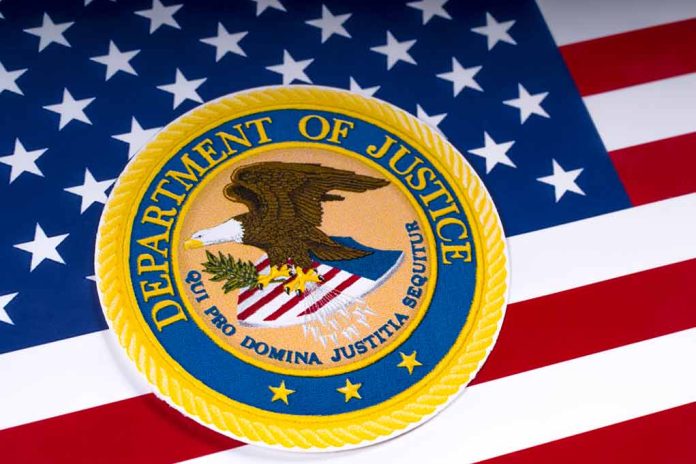
President Trump’s Department of Justice has firmly rejected contempt allegations in the Abrego Garcia case, telling a federal judge that courts lack authority to dictate foreign policy actions or violate El Salvador’s sovereignty.
Key Takeaways
- The DOJ has pushed back against Judge Paula Xinis’ demands for daily updates on efforts to return Kilmar Armando Abrego Garcia from El Salvador
- Trump administration officials argue federal courts cannot direct the Executive Branch on foreign relations matters
- DOJ clarified that “facilitating” Abrego Garcia’s return means removing domestic obstacles, not forcing another sovereign nation to act
- The government argues it has fulfilled the Supreme Court’s directive by treating the case as if Abrego Garcia had not been improperly deported
- Abrego Garcia’s attorneys have requested the court hold the administration in contempt if he is not returned promptly
DOJ Challenges Judicial Authority in Deportation Case
The Trump administration has taken a firm stance against what it views as judicial overreach in the case of Kilmar Armando Abrego Garcia, who was mistakenly deported to El Salvador. U.S. District Judge Paula Xinis has ordered the Justice Department to provide daily updates on efforts to return Abrego Garcia, expressing frustration over what she perceives as government inaction following a Supreme Court ruling directing his return to the United States.
The DOJ’s formal response emphasizes the constitutional separation of powers, specifically highlighting the President’s exclusive authority in foreign relations matters. The administration argues that while domestic immigration procedures can be subject to judicial review, courts cannot compel specific diplomatic actions or interfere with another nation’s sovereignty.
A deputy assistant attorney general told the judge overseeing the case of Kilmar Armando Abrego Garcia, the Maryland man who was deported to El Salvador in error, that he does "not have the information" regarding Abrego Garcia's whereabouts. https://t.co/KcZDdBsLDf
— ABC News (@ABC) April 11, 2025
Constitutional Powers at Stake
The dispute centers on the interpretation of the Supreme Court’s directive to “facilitate” Abrego Garcia’s return. The DOJ has taken a narrow view of this requirement, arguing that it refers only to removing domestic obstacles to his potential return, not compelling diplomatic action against El Salvador, where he is currently detained under that country’s own authority.
“The federal courts have no authority to direct the Executive Branch to conduct foreign relations in a particular way, or engage with a foreign sovereign in a given manner,” Trump officials stated in their filing. “That is the ‘exclusive power of the President as the sole organ of the federal government in the field of international relations.'”
President Trump’s administration has reported that Abrego Garcia is alive and secure in El Salvador, though detained under that country’s domestic authority. The Justice Department opposes further court supervision of diplomatic efforts, citing potential complications including attorney-client privilege and State Secrets concerns that could arise from the discovery process requested by Abrego Garcia’s attorneys.
Judicial Frustration Mounting
Judge Xinis has expressed growing impatience with the government’s response. During a recent hearing, she questioned officials about concrete actions taken to comply with the Supreme Court’s ruling. “The Supreme Court has spoken quite clearly. And yet, I can’t get an answer today about what you’ve done in the past, which means, again, the record as it stands, is that nothing has been done,” Judge Xinis stated.
The DOJ’s response to the contempt allegations was direct and uncompromising. In their brief, they stated: “The relief sought by Plaintiffs is inconsistent with the Supreme Court’s instruction requiring this Court to respect the President’s Article II authority to manage foreign policy.” Further, they argued that “any further intrusion into this sensitive process—and any directive from the Court to take action against the nation of El Salvador—would be inconsistent with the care counseled by the Supreme Court.”
Case Background and Ongoing Disputes
The case involves complex factual disputes. Abrego Garcia was deported despite a removal order specifying he should not be sent to El Salvador due to potential gang-related threats. The Trump administration has claimed he was an MS-13 gang member, which his attorneys deny. His legal team, led by Simon Sandoval-Moshenberg, has requested the court ensure his safe return and suggested holding the administration in contempt if compliance is not forthcoming.
“The Supreme Court upheld the District Judge’s order that the government has to bring Kilmar home. Now they need to stop wasting time and get moving,” said Sandoval-Moshenberg.
The DOJ maintains that the administration has fulfilled its obligations by treating the case as if Abrego Garcia had not been improperly sent to El Salvador. Officials argue that diplomatic discussions are ongoing but remain subject to the constraints of international relations and respect for foreign sovereignty, matters they insist fall squarely within the President’s constitutional authority.
Sources:
- ‘Nothing has been done’: Judge slams DOJ in case of wrongly deported man – ABC News
- DOJ: Courts have ‘no authority’ to force Abrego Garcia’s return
- Trump’s Department of Justice Tells Judge They’re No Longer Amused Playing Her Silly Games – RedState




